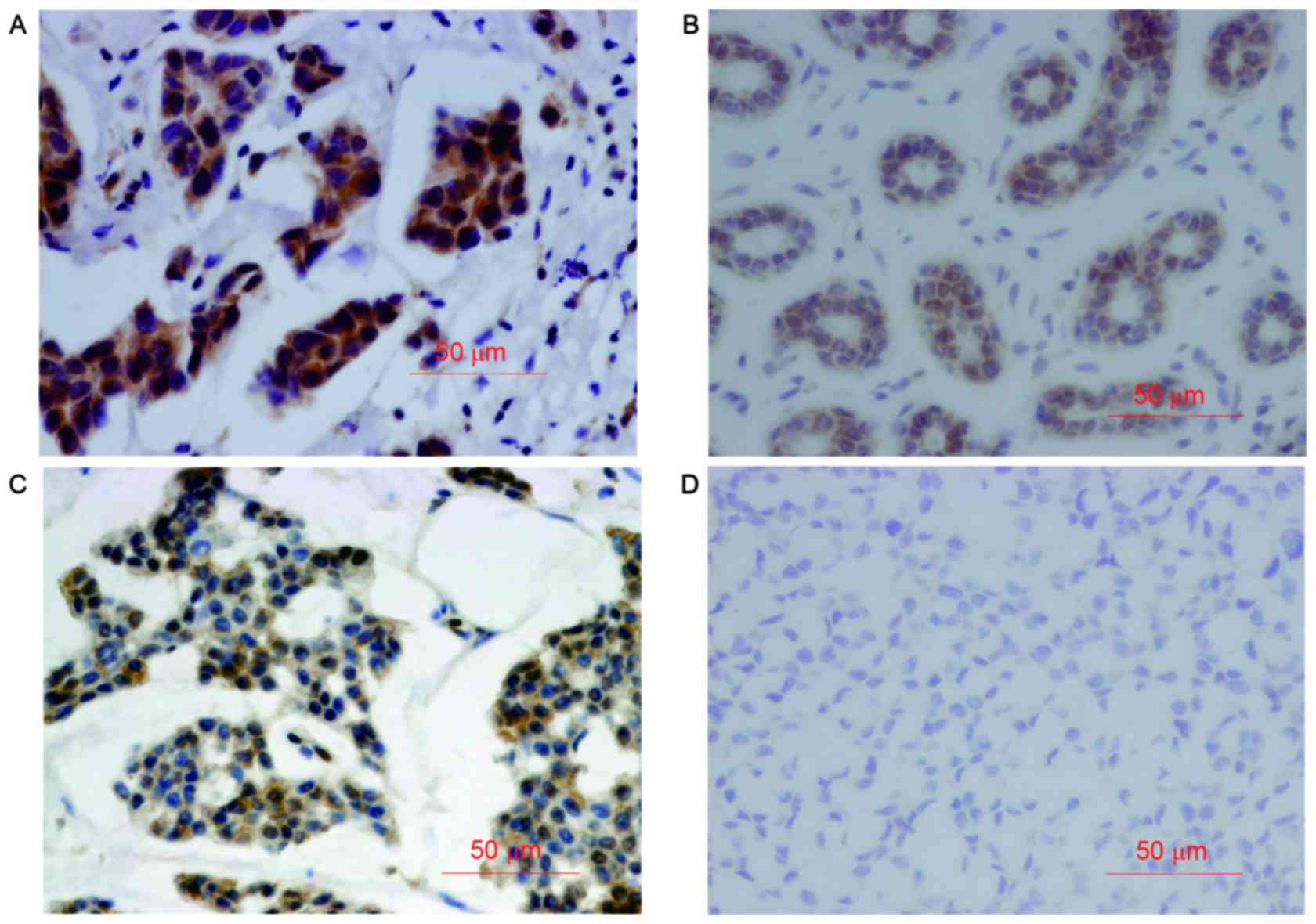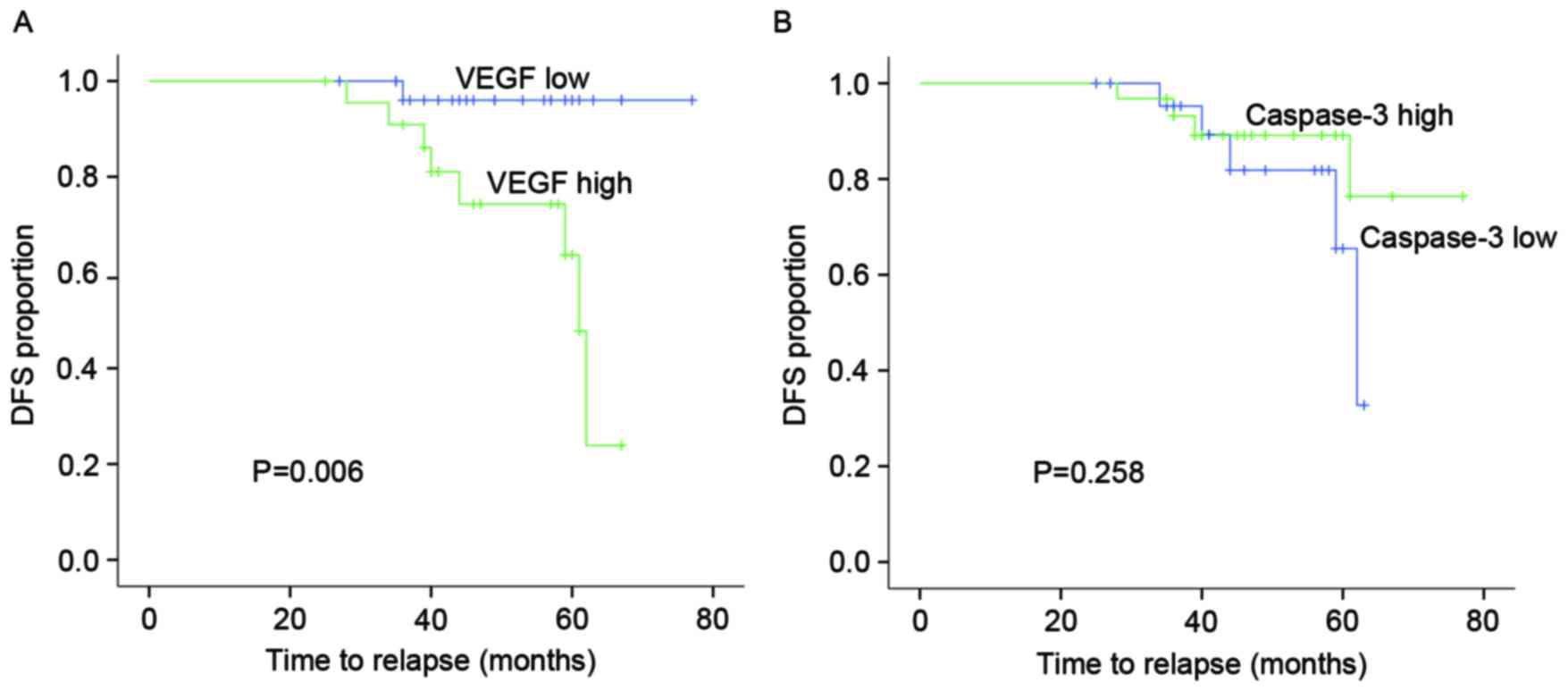|
1
|
Dumitru A, Procop A, Iliesiu A, Tampa M,
Mitrache L, Costache M, Sajin M, Lazaroiu A and Cirstoiu M:
Mucinous breast cancer: A review study of 5 year experience from a
hospital-based series of cases. Maedica (Buchar). 10:14–18.
2015.PubMed/NCBI
|
|
2
|
Ranade A, Batra R, Sandhu G, Chitale RA
and Balderacchi J: Clinicopathological evaluation of 100 cases of
mucinous carcinoma of breast with emphasis on axillary staging and
special reference to a micropapillary pattern. J Clin Pathol.
63:1043–1047. 2010. View Article : Google Scholar : PubMed/NCBI
|
|
3
|
Komaki K, Sakamoto G, Sugano H, Morimoto T
and Monden Y: Mucinous carcinoma of the breast in Japan. A
prognostic analysis based on morphologic features. Cancer.
61:989–996. 1988. View Article : Google Scholar : PubMed/NCBI
|
|
4
|
Ha KY, Deleon P and Deleon W: Invasive
mucinous carcinoma of the breast. Proc (Bayl Univ Med Cent).
26:295–297. 2013.PubMed/NCBI
|
|
5
|
Le Querrec A, Duval D and Tobelem G:
Tumour angiogenesis. Baillieres Clin Haematol. 6:711–730. 1993.
View Article : Google Scholar : PubMed/NCBI
|
|
6
|
Yancopoulos GD, Davis S, Gale NW, Rudge
JS, Wiegand SJ and Holash J: Vascular-specific growth factors and
blood vessel formation. Nature. 407:242–248. 2000. View Article : Google Scholar : PubMed/NCBI
|
|
7
|
Gasparini G: Prognostic value of vascular
endothelial growth factor in breast cancer. The oncologist 5 Suppl.
1:37–44. 2000. View Article : Google Scholar
|
|
8
|
Norris HJ and Taylor HB: Prognosis of
mucinous (Gelatinous) carcinoma of the breast. Cancer. 18:879–885.
1965. View Article : Google Scholar : PubMed/NCBI
|
|
9
|
Matsukita S, Nomoto M, Kitajima S, Tanaka
S, Goto M, Irimura T, Kim YS, Sato E and Yonezawa S: Expression of
mucins (MUC1, MUC2, MUC5AC and MUC6) in mucinous carcinoma of the
breast: Comparison with invasive ductal carcinoma. Histopathology.
42:26–36. 2003. View Article : Google Scholar : PubMed/NCBI
|
|
10
|
Ahmed A: The myoepithelium in human breast
carcinoma. J Pathol. 113:129–135. 1974. View Article : Google Scholar : PubMed/NCBI
|
|
11
|
Buckley CD, Pilling D, Henriquez NV,
Parsonage G, Threlfall K, Scheel-Toellner D, Simmons DL, Akbar AN,
Lord JM and Salmon M: RGD peptides induce apoptosis by direct
caspase-3 activation. Nature. 397:534–539. 1999. View Article : Google Scholar : PubMed/NCBI
|
|
12
|
Jänicke RU, Sprengart ML, Wati MR and
Porter AG: Caspase-3 is required for DNA fragmentation and
morphological changes associated with apoptosis. J Biol Chem.
273:9357–9360. 1998. View Article : Google Scholar : PubMed/NCBI
|
|
13
|
Mazumder S, Plesca D and Almasan A:
Caspase-3 activation is a critical determinant of genotoxic
stress-induced apoptosis. Methods Mol Biol. 414:13–21.
2008.PubMed/NCBI
|
|
14
|
Frank GA, Danilova NV, Andreeva IuIu and
Nefedova NA: WHO classification of tumors of the breast, 2012. Arkh
Patol. 75:53–63. 2013.(In Russian). PubMed/NCBI
|
|
15
|
Edge SB, Byrd DR and Compton CC: AJCC
Cancer Staging Manual. 7th. Springer; New York, NY: 2010
|
|
16
|
Kashiwagi S, Onoda N, Asano Y, Noda S,
Kawajiri H, Takashima T, Ohsawa M, Kitagawa S and Hirakawa K:
Clinical significance of the sub-classification of 71 cases
mucinous breast carcinoma. Springerplus. 2:4812013. View Article : Google Scholar : PubMed/NCBI
|
|
17
|
Zekioglu O, Erhan Y, Ciris M and
Bayramoglu H: Neuroendocrine differentiated carcinomas of the
breast: A distinct entity. Breast. 12:251–257. 2003. View Article : Google Scholar : PubMed/NCBI
|
|
18
|
Bae SY, Choi MY, Cho DH, Lee JE, Nam SJ
and Yang JH: Mucinous carcinoma of the breast in comparison with
invasive ductal carcinoma: Clinicopathologic characteristics and
prognosis. J Breast Cancer. 14:308–313. 2011. View Article : Google Scholar : PubMed/NCBI
|
|
19
|
Park S, Koo J, Kim JH, Yang WI, Park BW
and Lee KS: Clinicopathological characteristics of mucinous
carcinoma of the breast in Korea: Comparison with invasive ductal
carcinoma-not otherwise specified. J Korean Med Sci. 25:361–368.
2010. View Article : Google Scholar : PubMed/NCBI
|
|
20
|
Tseng HS, Lin C, Chan SE, Chien SY, Kuo
SJ, Chen ST, Chang TW and Chen DR: Pure mucinous carcinoma of the
breast: Clinicopathologic characteristics and long-term outcome
among Taiwanese women. World J Surg Oncol. 11:1392013. View Article : Google Scholar : PubMed/NCBI
|
|
21
|
Jao W, Lao IO, Chowdhury LN and Gould VE:
Ultrastructural aspects of mucinous (colloid) breast carcinoma.
Diagn Gynecol Obstet. 2:83–92. 1980.PubMed/NCBI
|
|
22
|
Rosen LS: VEGF-targeted therapy:
Therapeutic potential and recent advances. Oncologist. 10:382–391.
2005. View Article : Google Scholar : PubMed/NCBI
|
|
23
|
Ng IO, Poon RT, Lee JM, Fan ST, Ng M and
Tso WK: Microvessel density, vascular endothelial growth factor and
its receptors Flt-1 and Flk-1/KDR in hepatocellular carcinoma. Am J
Clin Pathol. 116:838–845. 2001. View Article : Google Scholar : PubMed/NCBI
|
|
24
|
Yonemura Y, Endo Y, Fujita H, Fushida S,
Ninomiya I, Bandou E, Taniguchi K, Miwa K, Ohoyama S, Sugiyama K
and Sasaki T: Role of vascular endothelial growth factor C
expression in the development of lymph node metastasis in gastric
cancer. Clin Cancer Res. 5:1823–1829. 1999.PubMed/NCBI
|
|
25
|
Hein A, Lambrechts D, von Minckwitz G,
Häberle L, Eidtmann H, Tesch H, Untch M, Hilfrich J, Schem C, Rezai
M, et al: Genetic variants in VEGF pathway genes in neoadjuvant
breast cancer patients receiving bevacizumab: Results from the
randomized phase III GeparQuinto study. Int J Cancer.
137:2981–2988. 2015. View Article : Google Scholar : PubMed/NCBI
|
|
26
|
McIlwain DR, Berger T and Mak TW: Caspase
functions in cell death and disease. Cold Spring Harb Perspect
Biol. 5:a0086562013. View Article : Google Scholar : PubMed/NCBI
|
|
27
|
Fuchs Y and Steller H: Programmed cell
death in animal development and disease. Cell. 147:742–758. 2011.
View Article : Google Scholar : PubMed/NCBI
|
|
28
|
Huang Q, Li F, Liu X, Li W, Shi W, Liu FF,
O'Sullivan B, He Z, Peng Y, Tan AC, et al: Caspase 3-mediated
stimulation of tumor cell repopulation during cancer radiotherapy.
Nat Med. 17:860–866. 2011. View
Article : Google Scholar : PubMed/NCBI
|
|
29
|
Kontzoglou K, Palla V, Karaolanis G,
Karaiskos I, Alexiou I, Pateras I, Konstantoudakis K and Stamatakos
M: Correlation between Ki67 and breast cancer prognosis. Oncology.
84:219–225. 2013. View Article : Google Scholar : PubMed/NCBI
|
















